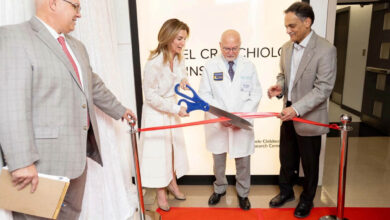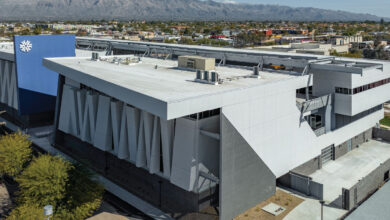
Banner-University Medical Center Tucson Earns Comprehensive Stroke Certification
Banner – University Medical Center Tucson has again earned The Joint Commission’s advanced comprehensive stroke certification, recognized nationwide as the gold standard in the treatment of the most complex stroke cases.
Banner – University Medical Center Tucson offers the only Joint Commission certified advanced comprehensive stroke center in Tucson. Together with Banner – University Medical Center Phoenix, the two academic medical centers provide Joint Commission comprehensive stroke services within the state. The certification is valid for two years.
A stroke, sometimes called a brain attack, occurs when a clot blocks blood supply to the brain or when a blood vessel in the brain bursts. Each year, approximately 800,000 people in the U.S. experience a stroke, and every 4 minutes someone dies of a stroke.
Developed in collaboration with the American Heart Association and the American Stroke Association, the certification recognizes the center’s ability to treat the most complex stroke patients 24 hours a day, seven days a week.
As a comprehensive stroke center, Banner provides a specialized team of cerebrovascular neurosurgeons, stroke neurologists, neurocritical care physicians, neuroscience nurses and staff, neuro-intensive care units, advanced imaging, post-hospital care, and access to stroke research and clinical trials.
“As the only academic medical center in Southern Arizona, our multidisciplinary team continues to deliver the most comprehensive care to patients with stroke and cerebrovascular diseases,” said Sarah Frost, CEO of Banner – University Medical Centers Tucson and South. “Our recertification ensures we are providing residents in Southern Arizona with the next generation of stroke care to significantly improve the outcomes for our stoke patients.”
The comprehensive stroke certification recognizes hospitals that meet standards to treat the most complex stroke cases and who have created a formal referral network to ensure the most complicated cases are treated by the centers equipped to provide this specialized care, ultimately leading to better outcomes.
Specifically, the comprehensive stroke certification recognizes hospitals that meet rigorous standards of performing endovascular thrombectomy, a surgical procedure to remove an arterial clot in the brain, as well as endovascular coiling and microsurgical clipping for patients with subarachnoid hemorrhages due to ruptured cerebral aneurysms. The certification requires that an acute stroke team, neurosurgical services, and dedicated intensive care beds are available 24/7 for acute ischemic and hemorrhagic stroke patients and the team can be at a bedside within 15 minutes.
“Our goal is to save lives and improve outcomes for stoke patients in Southern Arizona. As part of that commitment, we also provide stroke care education to other hospitals and health-care facilities, health-care professionals and the community, as well as to patients, family members and medical students,” said Dr. Chelsea S. Kidwell, aBanner – University Medicine neurologist, medical director of Banner’s Stroke Center, UArizona professor of neurology and medical imaging and the vice chair of neurology research. She also is a member of the UArizona Sarver Heart Center and the BIO5 Institute. Her specialty is stroke and cerebrovascular disease.





